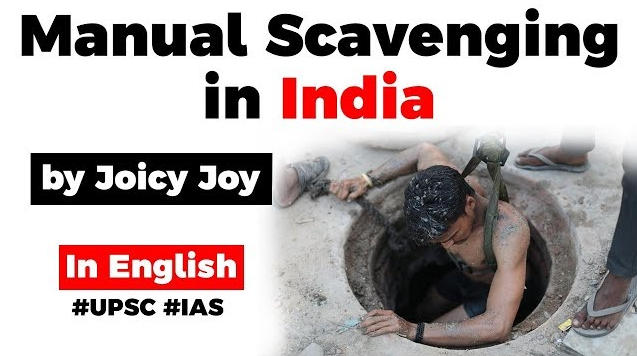Table of Contents
CURRENT AFFAIR
- The Central Monitoring Committee to review the implementation of the Prohibition of Employment as Manual Scavengers and their Rehabilitation Act, 2013 has mentioned that many states are lagging behind in the rehabilitation of manual scavengers.
- Death compensation has not been paid by states like Gujarat, Maharashtra.
TOPICS
- GS Paper 2
- Issues related to SCs and STs.
NUMBERS
- Since 1993, a total of 926 deaths related to the manual scavenging is reported in the country.
- 172 families are yet to receive compensation.
Engaged Workers
- According to the National Commission of Safai Karamcharis (NCSK), a total of 53,598 people, of which 29,923 were in Uttar Pradesh alone, had been identified as engaged in manual scavenging after surveys in 2013 and 2018.
DEATHS
- Tamil Nadu reported the highest number of deaths.
- But has paid compensation in all except seven of the 234 cases.
Compensation
- Gujarat has the highest number of cases where the compensation amount was not paid followed by Maharashtra.
Steps taken for Elimination
- One-time cash assistance
- Capital subsidy
- Skill development training
- To the identified manual scavengers.
GOVERNMENT INTERVENTIONS
- Self Employment Scheme for Rehabilitation of Manual Scavengers(SRMS) to rehabilitate remaining manual scavengers and their dependents in alternative occupations, in a time bound manner.
- Swachh Bharat Mission focus has been given on conversion of insanitary latrines into sanitary latrines.
- “Pre Matric Scholarship to the Children of those engaged in Occupations involving cleaning and prone to health hazards”, being implemented by the Ministry of Social Justice and Empowerment, the children of manual scavengers are also provided scholarship.
SC INTERVENTION
- Honorable Supreme Court of India gave landmark judgment to identify and award compensation of Rs 10 lakh to dependents in deaths of sewerage workers who died while cleaning sewerage and septic tanks since
Prohibition of Employment of Manual Scavengers and their Rehabilitation Act, 2013
- The Act prohibits the employment of manual scavengers, the manual cleaning of sewers and septic tanks without protective equipment, and the construction of insanitary latrines.
- It seeks to rehabilitate manual scavengers and provide for their alternative employment.
- Each local authority, cantonment board and railway authority is responsible for surveying insanitary latrines within its jurisdiction. They shall also construct a number of sanitary community latrines.
- Each occupier of insanitary latrines shall be responsible for converting or demolishing the latrine at his own cost. If he fails to do so, the local authority shall convert the latrine and recover the cost from him.
- The District Magistrate and the local authority shall be the implementing authorities.
- Offences under the Bill shall be cognizable and non- bailable, and may be tried summarily.
Reasons for Persistence of Manual Scavenging

- Low level of education, awareness about their rights, laws and low self esteem force them to take such work.
- Poor implementation of the existing laws.
- These section of society are not organized and don’t have any significant voice in the government
National Commission of Safai Karamcharis
- National Commission for Safai Karamcharis (NCSK) would monitor implementation of the Act and enquire into complaints regarding contravention of the provisions of the Act.
- The National Commission for Safai Karamcharis (NCSK) was constituted on 12th August 1994 as a statutory body by an Act of Parliament viz. ‘National Commission for Safai Karamcharis Act, 1993’.
- The act “The National Commission for Safai Karamcharis Act, 1993” lapsed in February 2004.
- The Commission is acting as a non-statutory body of the Ministry of Social Justice and Empowerment whose tenure is extended from time to time through Government Resolutions.
Latest Burning Issues | Free PDF






















 WhatsApp
WhatsApp